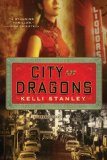Summary | Excerpt | Reviews | Beyond the Book | Read-Alikes | Genres & Themes | Author Bio

Critics' Opinion:
Readers' Opinion:
First Published:
Feb 2010, 352 pages
Paperback:
Aug 2011, 352 pages
 Book Reviewed by:
Book Reviewed by:
Kim Kovacs
Buy This Book
This article relates to City of Dragons
Hard-boiled fiction arose in the United States in the aftermath of WWI, and gained popularity and refinement in the years leading up to WWII. The popular genre was a direct reflection of the pessimism, uncertainty and disillusionment sweeping the country in the wake of gangster-driven crime, political scandal and economic crisis, and marked a decidedly American departure from the classic whodunit formula.
 Fiction magazines proliferated in the 1920's and one in particular, Black Mask, exclusively featured action-oriented detective stories. Founded in 1920 by H.L. Mencken and George Jean Nathan, it included the early efforts of such writers as Carroll John Daly and Dashiell Hammett. Captain Joseph T. Shaw, who favored "economy of expression" and "authenticity of character and action," took over as editor in 1926. His stylistic preferences molded the detective thriller into what is now defined as hard-boiled fiction, characterized by lean, direct writing and a sense of dark, gritty realism.
Fiction magazines proliferated in the 1920's and one in particular, Black Mask, exclusively featured action-oriented detective stories. Founded in 1920 by H.L. Mencken and George Jean Nathan, it included the early efforts of such writers as Carroll John Daly and Dashiell Hammett. Captain Joseph T. Shaw, who favored "economy of expression" and "authenticity of character and action," took over as editor in 1926. His stylistic preferences molded the detective thriller into what is now defined as hard-boiled fiction, characterized by lean, direct writing and a sense of dark, gritty realism.
A hard-boiled story typically features a morally ambiguous detective as the protagonist, who narrates in first person. He (in the early days of the genre the hero was always male) is cynical and tough, exposed to violence and able to take a beating, but not usually aggressively violent himself. He is often a cool and cocky character, able to respond flippantly to his antagonists, particularly in dangerous situations. He's a heavy smoker and drinker, and often a friend to those in the "undesirable" classes of society like petty thieves and prostitutes. He has a heightened sense of alienation and works alone, and he never gets the girl in the end (being more likely to arrest her or get her killed). Dashiell Hammett's Sam Spade and Raymond Chandler's Philip Marlowe are archetypes for this kind of protagonist.
Most of us are more familiar with the movies based on Hammett and Chandler's books than on the books themselves. Movies of the 1940s such as The Maltese Falcon and The Big Sleep cemented the hard-boiled detective in popular culture. French critics coined the term "film noir" ("black film") for these movies in 1946, although the phrase wasn't used in the United States until 1968, with the publication of Hollywood in the Forties, by Charles Higham and Joel Greenberg.
The French also introduced the expression roman noir ("black novel"), by which they refer to all American hard-boiled fiction. However, the United States equivalent, "literary noir," has a more narrow meaning and refers to a subset of the hard-boiled genre. George Tuttle wrote an oft-quoted article on the subject in Mystery Scene (1994):
"In this sub-genre, the protagonist is usually not a detective, but instead either a victim, a suspect, or a perpetrator. He is someone tied directly to the crime, not an outsider called to solve or fix the situation. Other common characteristics of this sub-genre are the emphasis on sexual relationships and the use of sex to advance the plot and the self-destructive qualities of the lead characters."
So, while the movie The Maltese Falcon is considered film noir, the book from which it's derived is hard-boiled fiction and not literary noir based on the characteristics described above. The differentiation between the two styles has become muddled as books that evoke film noir are colloquially referred to as literary noir, although these novels are actually more often hard-boiled.
View a film noir-style interview with Kelli Stanley held at Kepler's Books, starring a few of her favorite femme fatales:
Filed under Books and Authors
![]() This "beyond the book article" relates to City of Dragons. It originally ran in April 2010 and has been updated for the
August 2011 paperback edition.
Go to magazine.
This "beyond the book article" relates to City of Dragons. It originally ran in April 2010 and has been updated for the
August 2011 paperback edition.
Go to magazine.





The Funeral Cryer by Wenyan Lu
Debut novelist Wenyan Lu brings us this witty yet profound story about one woman's midlife reawakening in contemporary rural China.
Your guide toexceptional books
BookBrowse seeks out and recommends the best in contemporary fiction and nonfiction—books that not only engage and entertain but also deepen our understanding of ourselves and the world around us.